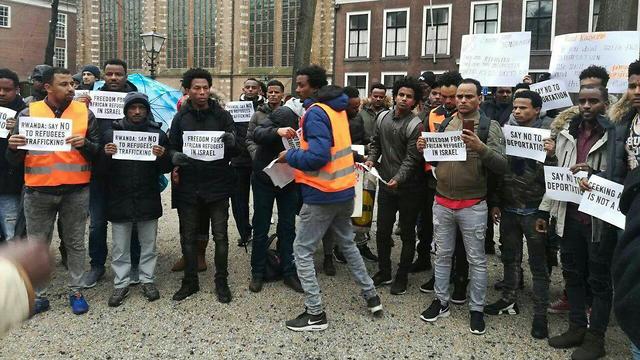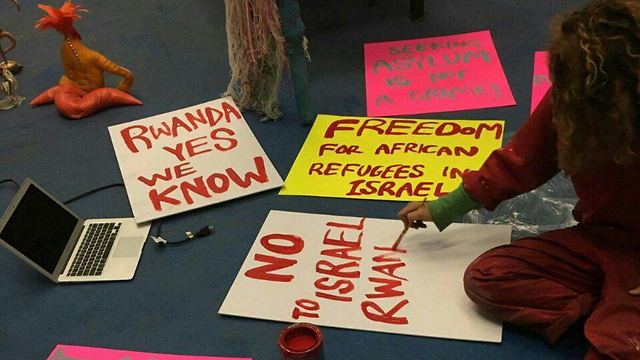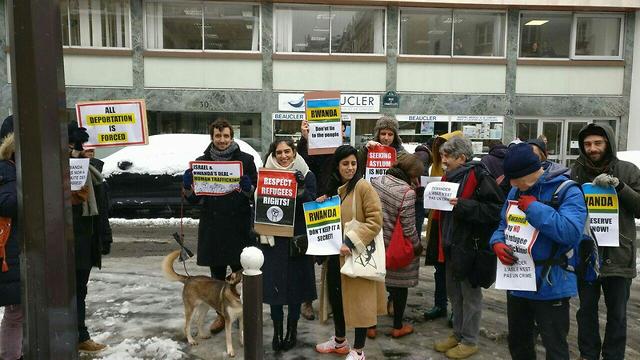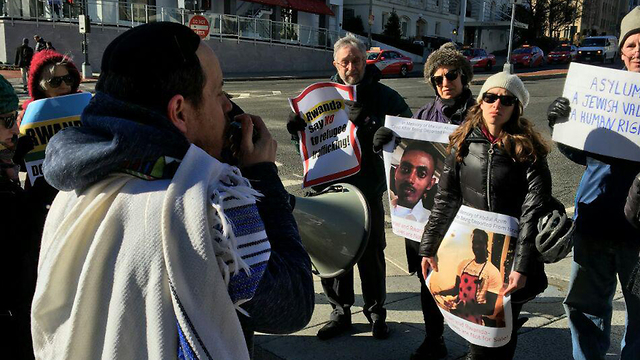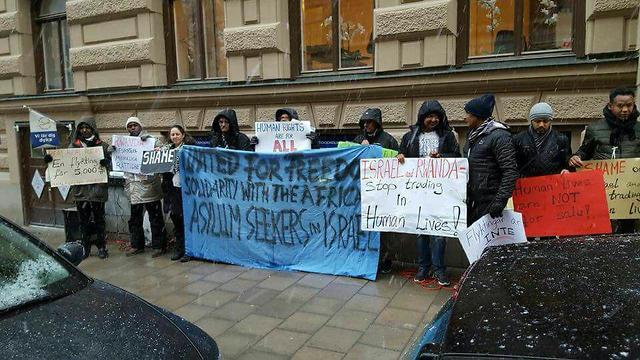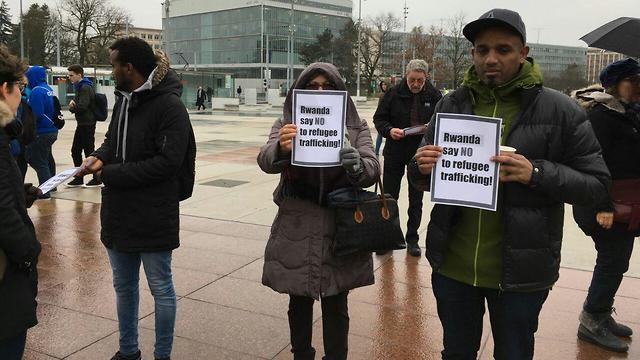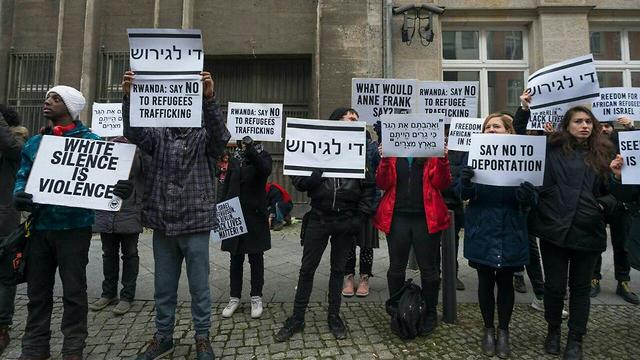
Asylum seekers protest agreement to deport them to Rwanda
Over 2,000 Eritrean and Sudanese refugees demonstrate outside the Rwanda Embassy in Herzliya Pituah, calling out 'Shame on you Rwanda' and 'We are not for sale'; similar protests to be held outside Rwanda embassies in other countries as well.
Israel has given thousands of migrants in the country until April 1 to accept an offer to leave for an unnamed African destination—widely known to be Rwanda, based on testimonies of people who have already left—in exchange for $3,500 and a plane ticket. Those who don't leave face indefinite incarceration.
The protesters said the plan would put them in danger and said the deportations were racist. They urged Rwanda and its president, Paul Kagame, not to cooperate.
"Kagame—We are not for sale," said one banner. "Prison or Deportation? What would you choose?" said another. "Would you deport me if I was white?" said another, held by protesters with faces painted white.
Protesters also chanted "Deportation kills," "We are not criminals. We are refugees," "we will not succumb to despair, we'll stop the expulsion," "acknowledging refugees is a moral duty," "We won't accept racist plans," "a refugee doesn't expel another refugee," and in English: "Shame on you Rwanda" and "We are not for sale."
Israel has 40,000 migrants, mostly from Eritrea and Sudan, who say they fled from danger at home. Both countries have poor human rights records.
Israel contends that most of the migrants are job seekers and cites complaints that they have transformed working class neighborhoods of south Tel Aviv into unrecognizable slums.
But the migrants and their supporters say those who have left have run into danger in Rwanda and Uganda, another destination country. They claim they have no rights in those countries, and quickly are forced to flee through war-torn countries like Sudan and Libya in hopes of making their way to Europe.
In a 2015 incident, a migrant who had left Israel was captured by Islamic State militants in Libya and decapitated.
The migrants say they do not want to settle in Israel, but want to remain as refugees until it is safe for them to return to their homelands.
Thousands of migrants entered Israel from neighboring Egypt until Israel completed a massive border fence to stop the flow. Since then, Israel has struggled to find a solution for those who entered the country.
The deportation plan has sparked outrage in Israel, where critics have called it unethical and a stain on Israel's image as a refuge for Jewish migrants.
The government says it has no obligation to take in migrants, and that it has taken steps to make sure they are not harmed. Women, children and families, for example, are exempt from the deportation order.
Similar protests are expected in front of Rwanda's embassies in other countries as well, including in Germany, France, the Netherlands, Denmark, the United States and Canada.
One of the protesters, Awat Ashbar, 37, from Eritrea, said he has been in Israel since 2008. "I live in Petah Tivka. Because I was (detained) in Holot, I'm not allowed to live in Tel Aviv. I asked for asylum, and I haven't received an answer yet. If my friends get expelled, so would I. That's what I'm afraid of," he said.
Ashbar said he will go to prison if he has no other choice. "If the state agrees for me to be in jail (instead of deportation), of course I will be. What else can you do? You ask for asylum, not prison, but if the state tells you to go to prison, I go to prison. I have no choice."
He said the agreement to take in the asylum seekers deported from Israel—which Rwanda has repeatedly denied signing—"is an agreement for us to die. We're saying: Don't make an agreement with Rwanda, because we could die, and we will be in danger."
Thomas Johnassen, 29, from Eritrea, has been in Israel for six years. He is currently staying at the Holot detention center in the Negev.
"I submitted a request for asylum about two years ago, and I haven't received an answer yet," he said. "I won't go to Rwanda. It's difficult to have to go to prison, but there's nothing else to do, (we would be in) mortal danger in Rwanda."
"I've heard from people who left willingly—not really willingly—about what's going on there. People disappear, people are trying to get to Europe and get murdered on the way," Johnassen said. "None of my friends is planning on leaving, they will all go to jail."
"I call on the Rwandan government not to take anyone, and to the Israeli government I say—it is forbidden to sell people in the 21st century."
Israeli citizens who oppose the deportation plan also came to protest.
"I left work and I came to protest, because this is a very important cause. This is what the country looks like, and it's very sad this is what we're doing to them," said Gidi Eizen, 26, from Tel Aviv. "They are refugees who came here, to the Jewish state, to receive protection, and we in response want to expel them to a place where they could get kidnapped, killed, and maybe even meet ISIS."
Eizen went on to say he has "a hard time with the lies being spread, there are people here who have horror stories to tell. The indifference of a country established by Holocaust survivors is outraging."
"I'm the daughter of refugees, and what we're doing is inhumane and contradicts the Jewish morals we've been raised on," said Hava, another Israeli protester. "I came here to protest for the first time, because it seems wrong to me to be sending people to their death. There are enough testimonies from there that their money gets stolen, that they need to flee one place to another, and that their lives are in danger."
This is the second such large scale protest outside the Rwandan embassy in Israel. Some 2,000 people also protested there in January, demanding Rwanda not to cooperate with Israel in expelling them.
Prof. Amnon Rubinstein, a law scholar and former minister, spoke to Ynet on Wednesday about the fact Israel is a signatory to the Convention Relating to the Status of Refugees.
The convention, he said "requires two things: First, to change each request on an individual basis. We've only done that for a small amount of the refugees here. Second, not to return to countries where they are expected to face danger."
Rubinstein argued Israel can meet both of these conditions. "For us, 40,000 people do not pose a financial problem. There is a problem with them being concentrated in southern Tel Aviv, I can understand the residents, but if you give them professional training, they will scattered throughout the country," he said.
 |
The Associated Press contributed to this report.










